
OPERATION AND PARTS MANUAL
Revision #2 (01/16/07)
THIS MANUAL MUST ACCOMPANY THE EQUIPMENT AT ALL TIMES.
SERIES
MODEL MVH-150D2
REVERSIBLE PLATE COMPACTOR
(YANMAR L48V6 DIESEL ENGINE)
To find the latest revision of this
publication, visit our website at:
www.multiquip.com

PAGE 2 — MVH-150D2 PLATE COMPACTOR — OPERATION AND PARTS MANUAL — REV. #2 (01/16/07)
Engine exhaust and some of its
MVH-150D2 — PROPOSITION 65 WARNING

MVH-150D2 PLATE COMPACTOR — OPERATION AND PARTS MANUAL — REV. #2 (01/16/07) — PAGE 3
NOTE PAGE

PAGE 4 — MVH-150D2 PLATE COMPACTOR — OPERATION AND PARTS MANUAL — REV. #2 (01/16/07)
MVH-150D2 — TABLE OF CONTENTS
MQ MIKASA SERIES MVH-150D2
PLATE COMPACTOR
Proposition 65 Warning .............................................. 2
Table Of Contents ...................................................... 4
Parts Ordering Procedures ........................................ 5
Safety Message Alert Symbols ............................... 6-7
Rules for Safe Operation ........................................ 8-9
Dimensions .............................................................. 10
Specifications ........................................................... 11
General Information ................................................. 12
Plate Compactor Components ................................. 13
Engine Components ................................................ 14
Inspection ............................................................ 15-16
Operation ............................................................ 17-18
Preparation For Long term Storage ........................ 18
Maintenance ....................................................... 19-21
Troubleshooting (Engine) ......................................... 22
Troubleshooting (Compactor) .................................. 23
Explanation Of Code In Remarks Column ............... 24
Suggested Spare Parts ............................................ 25
COMPONENT DRAWINGS
Nameplate and Decal (Placement) ..................... 26-27
Vibrating Plate Assembly .................................... 28-29
Body Assembly ................................................... 30-31
Vibrator Assembly ............................................... 32-33
Control Assembly ................................................ 34-37
Hand Pump Assembly......................................... 38-39
YANMAR L48V6F3R4AAW4
ENGINE
Cylinder Block Assembly .................................... 40-41
Cylinder Head Assembly .................................... 42-43
Air Cleaner Assembly......................................... 44-45
Muffler Assembly ............................................... 46-47
Crankshaft and Camshaft Assembly ................. 48-49
Piston Assembly ................................................. 50-51
Lub. Oil Pump and Governor Assembly ............. 52-53
Cooling and Starting Device Assembly .............. 54-55
Fuel Injection Pump Assembly ........................... 56-57
Fuel Tank and Fuel Line Assembly .................... 58-59
Tools, Labels and Gasket Set Assembly ............ 60-61
Terms and Conditions Of Sale — Parts .................. 62
Specification and part
number are subject to
change without notice.
NOTE

MVH-150D2 PLATE COMPACTOR — OPERATION AND PARTS MANUAL — REV. #2 (01/16/07) — PAGE 5
PARTS ORDERING PROCEDURES
www.multiquip.com
Ordering parts has never been easier!
Choose from three easy options:
WE ACCEPT ALL MAJOR CREDIT CARDS!
When ordering parts, please supply:
❒❒
❒❒
❒
Dealer Account Number
❒❒
❒❒
❒
Dealer Name and Address
❒❒
❒❒
❒
Shipping Address (if different than billing address)
❒❒
❒❒
❒
Return Fax Number
❒❒
❒❒
❒
Applicable Model Number
❒❒
❒❒
❒
Quantity, Part Number and Description of Each Part
❒❒
❒❒
❒
Specify Preferred Method of Shipment:
✓
UPS/Fed Ex
✓ DHL
■
Priority One
✓
Truck
■
Ground
■ Next Day
■
Second/Third Day
All orders are treated as
Standard Orders
and will ship the same day if received prior
to 3PM PST.
If you have an MQ Account, to obtain a
Username and Password, E-mail us at:
To obtain an MQ Account, contact your
District Sales Manager for more information.
Order via Internet (Dealers Only):
Order parts on-line using Multiquip’s SmartEquip website!
■
View Parts Diagrams
■
Order Parts
■
Print Specification Information
Note: Discounts Are Subject To Change
Goto www.multiquip.com and click on
Order Parts
to log in and save!
Use the
internet
and qualify for a 5% Discount
on
Standard orders
for all orders which include
complete part numbers.*
Order via Fax (Dealers Only):
All customers are welcome to order parts via Fax.
Domestic (US) Customers dial:
1-800-6-PARTS-7 (800-672-7877)
Fax
your order in and qualify for a 2% Discount
on
Standard orders
for all orders which include
complete part numbers.*
Order via Phone:
Domestic (US) Dealers Call:
1-800-427-1244
Best Deal!
International Customers
should contact
their local Multiquip Representatives for
Parts Ordering information.
Non-Dealer Customers:
Contact your local Multiquip Dealer for
parts or call 800-427-1244 for help in
locating a dealer near you.
Note: Discounts Are Subject To Change
NOTE
Effective: January 1
st
, 2006

PAGE 6 — MVH-150D2 PLATE COMPACTOR — OPERATION AND PARTS MANUAL — REV. #2 (01/16/07)
MVH-150D2 — SAFETY MESSAGE ALERT SYMBOLS
This Owner's Manual has
been developed to provide
complete instructions for the
safe and efficient operation
of the Multiquip Model
MVH-150D2 ReversiblePlate
Compactor.
Refer to the engine manufacturer’s instructions for data
relative to its safe operation.
Before using this plate compactor, ensure that the
operating individual has read and understands all
instructions in this manual.
HAZARD SYMBOLS
NOTE
Safety precautions should be followed
at all times when operating this
equipment. Failure to read and
understand the Safety Messages and
Operating Instructions could result in
injury to yourself and others.
FOR YOUR SAFETY AND THE SAFETY OF OTHERS!
SAFETY MESSAGE ALERT SYMBOLS
The three (3) Safety Messages shown below will inform you
about potential hazards that could injure you or others. The
Safety Messages specifically address the level of exposure
to the operator, and are preceded by one of three words:
DANGER, WARNING, or CAUTION.
Potential hazards associated with the operation of an
MVH-150D2 Plate Compactor
will be referenced with Hazard
Symbols which appear throughout this manual, and will be
referenced in conjunction with Safety Message Alert
Symbols.
Engine exhaust gases contain
poisonous carbon monoxide. This gas
is colorless and odorless, and can
cause death if inhaled. NEVER operate
this equipment in a confined area or
enclosed structure that does not provide
ample free flow air.
WARNING - Lethal Exhaust Gases
Diesel fuel is extremely flammable, and
its vapors can cause an explosion if ignited.
DO NOT start the engine near spilled fuel
or combustible fluids.
DO NOT fill the fuel tank while the engine is running or
hot. DO NOT overfill tank, since spilled fuel could ignite if
it comes into contact with hot engine parts or sparks from
the ignition system. Store fuel in approved containers, in
well-ventilated areas and away from sparks and flames.
WARNING - Explosive Fuel
Engine components can generate extreme
heat. To prevent burns, DO NOT touch
these areas while the engine is running or
immediately after operations. Never
operate the engine with heat shields or heat
guards removed.
WARNING - Burn Hazards
ALWAYS wear approved
respiratory
protection when required.
CAUTION - Respiratory Hazard
You WILL be
KILLED
or
SERIOUSLY INJURED
if you DO NOT follow these directions.
DANGERDANGER
DANGERDANGER
DANGER
You CAN be KILLED or
SERIOUSLY INJURED
if
you DO NOT follow these directions.
WARNINGWARNING
WARNINGWARNING
WARNING
You CAN be
INJURED
if you DO NOT follow
these directions.
CAUTICAUTI
CAUTICAUTI
CAUTION

MVH-150D2 PLATE COMPACTOR — OPERATION AND PARTS MANUAL — REV. #2 (01/16/07) — PAGE 7
MVH-150D2 — SAFETY MESSAGE ALERT SYMBOLS
This plate compactor, other
property, or the surrounding
environment could be damaged
if you do not follow instructions.
NOTE
Other important messages are provided throughout this
manual to help prevent damage to your COMPACTOR,
other property, or the surrounding environment.
ALWAYS wear approved eye and
hearing protection.
NEVER operate equipment with covers,
or guards removed. Keep fingers, hands,
hair and clothing away from all moving
parts to prevent injury.
CAUTION - Rotating Parts
CAUTION - Sight and Hearing Hazards
CAUTION - Equipment Damage Messages
UNLEADED
FUEL
PLASTIC
TRUCK-BED
LINER
DO NOT ADD FUEL
TO COMPACTOR IF
COMPACTOR IS PLACED
INSIDE TRUCK-BED WITH
PLASTIC LINER. POSSIBILITY EXISTS
OF EXPLOSION OR FIRE DUE TO
.STATIC ELECTRICITY
DANGER
UNLEADED
FUEL

PAGE 8 — MVH-150D2 PLATE COMPACTOR — OPERATION AND PARTS MANUAL — REV. #2 (01/16/07)
■
ALWAYS refuel in a well-ventilated area, away from sparks
and open flames.
■
ALWAYS use extreme caution when
working with flammable liquids. When
refueling, stop the engine and allow it to
cool. DO NOT
smoke around or near the
machine. Fire or explosion could result from
fuel vapors, or if fuel is spilled on a hot
engine.
■
NEVER touch the hot exhaust manifold,
muffler or cylinder. Allow these parts to
cool before servicing engine or plate
compactor.
■
High Temperatures – Allow the engine to cool before adding
fuel or performing service and maintenance functions. Contact
with
hot
components can cause serious burns.
The following safety guidelines should always be used when
operating the
compactor
:
GENERAL SAFETY
■
DO NOT operate or service this equipment before reading this entire
manual.
■
This equipment should not be operated by persons under 18
years of age.
■
NEVER operate this equipment without proper protective
clothing, shatterproof glasses, steel-toed boots and other
protective devices required by the job.
■
NEVER operate this equipment when not feeling
well due to fatigue, illness or taking medicine.
■
NEVER operate this equipment under the influence or drugs or
alcohol.
■
Whenever necessary, replace nameplate, operation and
safety decals when they become difficult read.
■
ALWAYS check the machine for loosened threads or bolts
before starting.
■
ALWAYS wear proper respiratory (mask)
hearing and eye protection equipment when
operating the pump.
MVH-150D2 — RULES FOR SAFE OPERATION
■
The engine of this compactor
requires an adequate free flow of
cooling air.
NEVER!
operate the
compactor in any enclosed or
narrow area where free flow of the
air is restricted. If the air flow is
restricted it will cause serious
damage to the compactor or engine and may cause injury
to people and property. Remember the engine gives off
DEADLY gases.
Failure to follow instructions in this manual
may lead to serious injury or even death!
This equipment is to be operated by trained
and qualified personnel only! This
equipment is for industrial use only.
DANGER - Read Manual
■
NEVER operate the equipment in an
explosive
atmosphere
or near
combustible materials. An explosion or fire
could result causing severe
bodily harm
or even death.
■
Topping-off to filler port is dangerous, as it tends to spill fuel.
■
Refer to the
Engine Owner's Manual
for engine technical
questions or information.
■
NEVER use accessories or attachments, which are not
recommended by Multiquip for this equipment. Damage to the
equipment and/or injury to user may result.
■
Manufacturer does not assume responsibility for any accident
due to equipment modifications.

MVH-150D2 PLATE COMPACTOR — OPERATION AND PARTS MANUAL — REV. #2 (01/16/07) — PAGE 9
MVH-150D2 — RULES FOR SAFE OPERATION
Maintenance Safety
■
NEVER lubricate components or attempt service on a
running machine.
■
ALWAYS allow the machine a proper amount of time to
cool before servicing.
■
Keep the machinery in proper running condition.
■
Fix damage to the machine immediately and always replace
broken parts.
■
Dispose of hazardous waste properly. Examples of
potentially hazardous waste are used motor oil, fuel and
fuel filters.
■
DO NOT use food or plastic containers to dispose of
hazardous waste.
■
DO NOT pour waste, oil or fuel directly onto the ground,
down a drain or into any water source.
■
Removing the engine oil drain plug while
the engine is hot will result in hot oil to gush
out of the oil drain plug, therefore causing
severe scalding to any persons in the
general area of the generator.
Loading and Unloading
■
Before lifting compactor, make sure that machine parts, guard
hook, and vibration insulators are not damaged and screws
are not loosened or lost.
■
When using a crane or lifting device, always make sure that
it is properly secured to the guard hook on the compactor.
Emergencies
■
ALWAYS know the location of the
nearest
fire extinguisher
.
■
ALWAYS know the location of the nearest
first aid kit
.
■
In emergencies
always
know the location of the
nearest phone or
keep a phone on the job site
.
Also know the phone numbers of the nearest
ambulance
,
doctor
and
fire department
. This
information will be invaluable in case of an
emergency.
TRANSPORTING
■
ALWAYS shutdown engine before transporting.
■
Tighten fuel tank cap securely and close fuel cock to prevent
fuel from spilling.
■
Drain fuel when transporting compactor over long distances
or bad roads.
■
ALWAYS tie down the compactor during transportation by
securing the compactor's guard frame with ropeso that it will
not move or topple over.
■
NEVER lift the machine while the engine is running.
■
ALWAYS use an adequate lifting chain, strap or rope of
sufficient strength.
■
Use one point suspension hook and lift straight upwards.
■
NEVER allow any person or animal to stand underneath the
machine while lifting.
■
Try not to lift machine to unnecessary heights

PAGE 10 — MVH-150D2 PLATE COMPACTOR — OPERATION AND PARTS MANUAL — REV. #2 (01/16/07)
MVH-150D2 — DIMENSIONS
Figure 1. MVH-150D2 Reversible Plate Compactor Dimensions
SNOISNEMID.1ELBAT
ECNEREFER
RETTEL
SNOISNEMID
)MM(.NI
A
).mm234(.ni0.71
B
).mm577(.ni5.03
C
).mm290,1(.ni34
D
).mm066(.ni0.62
B
C
D
A

MVH-150D2 PLATE COMPACTOR — OPERATION AND PARTS MANUAL — REV. #2 (01/16/07) — PAGE 11
MVH-150D2 — SPECIFICATIONS
)enignE(snoitacificepS.3elbaT
enignE
ledoM
RAMNAY
4WAA4R3F6V84L
epyT
lacitreV,ekorts4delooc-riA
leseiD,rednilyCelgniS
enignE
ekortSXeroB
.ni
8.1x.ni7.2
)mm75xmm07(
tnemecalpsiD)ni-uc4.31(cc912
tuptuOxaM.M.P.R0063/.P.H2.4
yticapaCknaTleuF
snollag.S.U
36.0.xorppA
)sretil4.2(
leuFleuFleseiD
yticapaCliOebuL)sretil08.(.stq48.0
dohteMgnitratStratSlioceR
)HxWxL(no
isnemiD
.ni5.61x1.51x1.31
mm8.714x5.483x5.233(
thgieWteNyrD
).gK5.62(sbl4.85
)rotcapmoC(snoitacificepS.2ELBAT
sledoM2D051-HVM
ecroFlagufirtneC)gk200,3(.sbl026,6
snoitarbiVforebmuNnim/s
noitarbiv006,5
deepSgnilevarT)nim/sretem32(nim/.tf57
)WxL(eziSetalP
.ni0.62x0.71
)mm007x034(
thgieWgnitarep
O)gk261(.sbl753

PAGE 12 — MVH-150D2 PLATE COMPACTOR — OPERATION AND PARTS MANUAL — REV. #2 (01/16/07)
MVH-150D2 — GENERAL INFORMATION
Plate Compactor
The Mikasa MVH-150D2 is a walk-behind reversible plate
compactor designed for the compaction of sand, clay and asphalt.
This plate compactor is a powerful compacting tool capable of
applying a tremendous force in consecutive high frequency
vibrations to a soil surface. Its applications include soil compacting
for road, embankments and reservoirs as well as backfilling for
gas pipelines, water pipelines and cable installation work.
Compactor Components
This plate compactor is comprised of an anti-vibration handle,
vibrating case (eccentric), water tank, guard hook, rubber shock
absorbers and a Yanmar diesel engine.
Reversible Vibratory Plates
Reversible vibratory plates have two eccentric weights that allow
a smooth transition for forward and reverse travel, plus increased
compaction force as the result of dual weights.
Due to their weight and force, reversible plates are ideal for semi-
cohesive soils.
Power Transfer
The Mikasa MVH-150D2 Plate Compactor is equipped with an
air-cooled, vertical single-cylinder, 4-stroke Yanmar L48V6 diesel
engine. A centrifugal clutch is attached to the output shaft of the
engine and will engage when the engine speed reaches
approximately 2,300 ~ 2,600 rpm’s.
Engine shaft speed is transfered via engine pulley and V-belt to
vibrator pulley. The vibrator pulley rotates an eccentric rotor shaft
(2) one for foward one for reverse that is contained within the
vibrator case.
The generated vibration created from the eccentric rotor is
transmitted to the compacting plate. This vibration causes the
compactor to move in either a forward or reverse direction.
Frequency/Speed
The compactor's vibrating plate maximum frequency is 6,000
vpm (vibrations per minute). The forward and reverse travel speed
of the compactor is approximately 75ft./minute (23 meters/minute).
Controls
Before starting the MVH-150D2 Plate Compactor, identify and
understand the function of the controls and components as
indicated in Figure 2.

MVH-150D2 PLATE COMPACTOR — OPERATION AND PARTS MANUAL — REV. #2 (01/16/07) — PAGE 13
MVH-150D2 — COMPONENTS (PLATE COMPACTOR)
Figure 2. MVH-150D2 Components
Figure 2 shows the location of the controls, indicators and general
maintenance parts. The function of each control is described
below:
1. Breather Cap – Remove this cap to bleed (remove air) the
hydraulic system. When replacing hydraulic oil, use "Shell
Tellus #46 or equivalent".
2. Hand Grip – When operating the compactor use this hand
grip to manuever the compactor.
3. Handle Lock – Pull handle bar downward (working
position), then pull handle lock to lock handle bar in place.
4. Vibration Case Oil Level Check Plug – Remove this plug
to check the vibration case oil. Oil level should be all the
way up to the filler port. When replacing vibration case oil,
use 10W-30 engine oil.
5. Handle Bar (working position) – When operating the
compactor, this handle is to be in the downward position.
6. Handle Bar (stored position) – When the compactor is
to be
stored
, move the handle bar to the upright position.
7. Engine – This plate compactor use a YANMAR L48V6
diesel engine. Refer to the owner’s manual for engine
information and related topics.
8. Belt Cover – Remove this cover to gain access to the V-
belts. NEVER run the compactor without the V-belt cover. If
the V-belt cover is not installed, the possibility exist that
your hand may get caught between the V-belt and clutch,
thus causing serious injury and bodily harm.
9. Vibration Case – Encloses the eccentric, gears and
counter weights.
10. Forward and Reverse Lever –
Push
the lever forward,
the compactor will move in a forward direction,
pull
the
lever backwards, the compactor will move in backwards
direction. Placing the lever in the middle (midway) will cause
the compactor not to move (neutral).

PAGE 14 — MVH-150D2 PLATE COMPACTOR — OPERATION AND PARTS MANUAL — REV. #2 (01/16/07)
MVH-150D2 — COMPONENTS (YANMAR L48V6 ENGINE)
Figure 3. Engine Controls and Components
The engine shown above is a
YANMAR L48V6
engine (Figure 3).
The engine must be checked for proper lubrication and filled
with fuel prior to operation. Refer to the manufacturer’s engine
manual for instructions and details of operation and servicing.
Each component is described below:
1. Fuel Filler Cap – Remove this cap to add unleaded
gasoline to the fuel tank. Make sure cap is tightened
securely. DO NOT over fill.
2. Fuel Tank – Capacity is 2.5 quarts (2.4 liters) of diesel
fuel.
3. Air Cleaner – Prevents dirt and other debris from entering
the fuel system. Remove wing-nut on top of air filter
cannister to gain access to filter element.
4. Muffler – Used to reduce noise and emissions.
5. Recoil Starting Handle (pull rope) – Type of engine
starting method.
Operating the engine without
an air filter, with a damaged
air filter, or a filter in need of
replacement will allow dirt to
enter the engine, causing
rapid engine wear.
NOTE
Engine components can generate extreme heat.
To prevent burns, DO NOT touch these areas
while the engine is running or immediately after
operating. NEVER operate the engine with the
muffler removed.
CAUTION - Burn Hazard
7. Oil Filler Cap / Dipstick – Remove this cap to add oil to the
engine crankcase. Read dipstick to determine if oil level is
low. DO NOT over fill.
8. Oil Drain Plug – Unscrew plug to drain oil from engine
crankcase. Dispose of oil in a safe manner.
9. Decompression Lever– Press down before starting
engine. To prevent damage to engine, DO NOT use for any
other purpose.
10. Fuel Cock– Controls the flow of diesel fuel to the carburetor.
Must be in the ON position when starting and running the
engine.
11. Speed Control Lever– Regulates engine speed.
DANGER - Explosive Fuel Hazard
Adding fuel to the tank should be done only when
the engine is stopped and has had an
opportunity to cool down. In the event of a fuel
spill, DO NOT attempt to start the engine untill
the fuel residue has been completely wiped up,
and the area surrounding the engine is dry.
6. Recoil Starter– Manual-starting method. Pull the starter
grip until resistance is felt, then pull briskly and smoothly.
1
2
10
5
3
4
8
7
6
9
11

MVH-150D2 PLATE COMPACTOR — OPERATION AND PARTS MANUAL — REV. #2 (01/16/07) — PAGE 15
MVH-150D2 — INSPECTION
Figure 5. Engine Oil Dipstick (Removal)
3. Insert and remove the dipstick without screwing it into the filler
neck. Check the oil level shown on the dipstick.
4. If the oil level is low (Figure 6), fill to the edge of the oil filler
hole with the recommended oil type (Table 4). Maximum oil
capacity is 0.84 quarts (0.80 liters).
Figure 6. Engine Oil Dipstick (Oil Level)
Before Starting:
1. Read safety instructions at the
beginning of manual.
2. Remove dirt and dust, particularly
in the engine cooling air inlet,
carburetor and air cleaner.
3. Check the air filter for dirt and dust.
If air filter is dirty, replace air filter with a new one as required.
4. Check carburetor for external dirt and dust. Clean with dry
compressed air.
5. Check fastening nuts and bolts for tightness.
Fuel Check:
1. Remove the fuel cap located on top of fuel tank.
2. Visually inspect to see if the fuel level is low. If fuel is low,
replenish with clean diesel fuel.
3. When refueling, be sure to use a strainer for filtration. DO NOT
top-off fuel. Wipe up any spilled fuel
immediately!
Explosive Fuel
CAUTION - General Safety Precautions
ALWAYS wear approved eye and hearing
protection before operating the compactor.
NEVER operate the compactor in a confined
area or enclosed area structure that does not
provide ample
free flow of air
.
Engine Oil Check:
1. To check the engine oil level, place the compactor on secure
level ground with the engine stopped.
2. Remove the filler dipstick from the engine oil filler hole
(Figure 5) and wipe clean.
Diesel is extremely flammable, and its vapors
can cause an explosion if ignited. DO NOT
start the engine near spilled fuel or
combustible fluids. DO NOT smoke while
refueling. DO NOT attempt to refuel the
compactor if the engine is
hot!
or
running
.
DANGER - Explosive Fuel

PAGE 16 — MVH-150D2 PLATE COMPACTOR — OPERATION AND PARTS MANUAL — REV. #2 (01/16/07)
2. The V-belt tension is proper if the V-belt bends 10 to 15 mm
(Figure 9) when depressed with finger at midway between
the clutch and vibration pulley shafts.
MVH-150D2 — INSPECTION
CLUTCH
PULLEY
VIBRATOR
PULLEY
V-Belt Check
Figure 7. V-Belt Hazard
1. To check the V-belt tension (Figure 8 ), remove
upper
belt
cover.
Figure 8. V-Belt Cover Removal
3. A loose V-belt will decrease the power transmission output,
causing reduced compaction and premature wear of the
belt.
4. If the V-belt becomes worn or loose, replace it. See
maintenance section.
Figure 9. V-Belt Tension
Figure 10. Vibrator Oil Plug
Vibrator Oil Check
1. Place the MVH-150D2 plate compactor horizontally on a flat
surface. Make sure the compactor is level when checking the
oil in the vibrator assembly.
2. With the handle bar positioned vertically (storage position),
use a 24 mm wrench and remove breather plug (Figure 10).
Visually check to see if hydraulic oil comes up to the oil level
line that is etched on the back side of the handle.
NEVER attempt to check the V-belt with the engine running.
Severe injury can occur of your hand (Figure 7) gets caught
between the V-belt and the clutch. Always use safety gloves.
CAUTION - V-Belt Check
3. If the hydraulic oil level is low, replace with "Shell Tellus" oil
#46 or equivalent.

MVH-150D2 PLATE COMPACTOR — OPERATION AND PARTS MANUAL — REV. #2 (01/16/07) — PAGE 17
Starting the Engine
1. Open the fuel cock
(Figure 11).
2. Move the engine speed control lever (Figure 12) to the
IDLE position.
Figure 12. Engine Speed Control Lever (Idle Position)
4. Grasp the starter grip (Figure 14) and slowly pull it out. The
resistance becomes the hardest at a certain position, corre-
sponding to the compression point. Pull the starter grip briskly
and smoothly for starting.
3. Push down the decompression lever (Figure 13) and re-
lease.
This section is intended to assist the operator with the
initial
start-up
of the compactor. It is extremely important that this
section be read carefully before attempting to use the compactor
in the field.
MVH-150D2 — OPERATION
Figure 14. Starter Grip
Figure 13. Decompression Lever
Figure 11. Fuel Cock
5. If the engine does not start, repeat steps 1 thru 4.
Figure 15. Speed Control Lever (Fast Position)
Operation
1. Once the engine has started, move the engine speed lever
quickly
to the
FAST
(Figure 15) position.
2. With the engine speed control lever placed in the FAST
position, the engine speed should be between 2,300 ~2,600
RPM’s, therefore engaging the centrifugal clutch.
ALWAYS
move the throttle lever
quickly without hesitation,
because increasing the engine
speed slowly causes the clutch
to slip.
NOTE
IDLE
ENGINE SPEED
CONTROL
LEVER
FAST
ENGINE SPEED
CONTROL
LEVER

PAGE 18 — MVH-150D2 PLATE COMPACTOR — OPERATION AND PARTS MANUAL — REV. #2 (01/16/07)
MVH-150D2 — OPERATION/PREPARATION FOR LONG TERM STORAGE
Whenever the compactor's vibra-
tion becomes weak or lost during
normal operation, regardless of
operation hours, check the V-belt
and clutch immediately.
NOTE
4. Firmly gasp the compactor's handle bar with both hands , the
compactor will begin moving forward.
5. Slowly walk behind the compactor and be on the lookout for
any large objects or foreign matter that might cause damage
to the compactor or bodily injury.
6. Compactor traveling speed may drop on soils which contain
clay, however there may be cases where traveling speed
drops because the compaction plate does not leave the
ground surface easily due to the composition of the soil. To
rectify this problem do the following:
Figure 17. Speed Control Lever (Stop Position)
■
Check the bottom plate to see if clay or equivalent material
has been lodged in the plate mechanism. If so, wash with
water and remove.
■
Remember the compactor does not work as efficiently on
clay or soils that have a high moisture content level.
■
If the soil has a high moisture level, dry soil to appropriate
moisture content level or carry out compaction twice.
Emergency Shutdown Procedure:
1. Move the speed control lever quickly to the STOP
position
(Figure 17).
2. Close the fuel cock.
Normal Shut-Down Procedure:
1. Place the speed control lever in the IDLE position. Allow the
engine to cool down for 2 to 3 minutes.
2. Next, place the speed control lever in the STOP position
(Figure 17) to stop the engine.
3. Close the fuel cock (Figure 11).
Make sure to follow all safety rules referenced in the safety
section of this manual before operating compactor. Keep work
area clear of debris and other objects that could cause
damage to the compactor or bodily injury.
CAUTION - Safety Rules
Compactor Storage
For storage of the compactor for over 30 days, the following
is required:
■
Drain the fuel tank completely, or add STA-BIL to the fuel.
■
Run the engine until the fuel in the injection system is
completely consumed.
■
Completely drain the oil from the crankcase and refill with
fresh oil.
■
Pour 2 or 3 cc of SAE 30 oil into the cylinder and crank slowly
to distribute the oil.
■
Pull out the starter rope slowly and stop at the compression
point.
■
Clean all external parts of the compactor with a cloth.
■
Cover the compactor and store in a clean, dry place.
3. To make the compactor move in the forward direction push
the travel lever ( Figure 16) forward. To make the compactor
move in the reverse direction pull the travel lever backwards.
Figure 16. Direction Lever
STOP
SPEED
CONTROL
LEVER

MVH-150D2 PLATE COMPACTOR — OPERATION AND PARTS MANUAL — REV. #2 (01/16/07) — PAGE 19
MVH-150D2 — MAINTENANCE
Inspection and Maintenance Service Tables.
To make sure your plate compactor is always in good working
condition before using, carry out the maintenance inspection in
accordance with Tables 5 through 7.
Daily Service
z
Check for leakage of fuel or oil.
z
Check for loose screws including tightness. See Table 7
below (tightening torque ), for retightening:
z
Remove soil and clean the bottom of compaction plate.
z
Check vibrating case for any oil leakage.
z
Check engine oil.
These inspection intervals are for
operation under normal conditions.
Adjust your inspection intervals
based on the number hours plate
compactor is in use, and particular
working conditions. Fuel piping and
connections should be replaced
every 2 years.
Inspection and other services should
always
be carried out
on hard and level ground with the engine shutdown.
CAUTION - General Maintenance Safety
NOTE
NOITCEPSNIENIHCAM.5ELBAT
metI noitarepOfosruoH
)kcehcgnitratS(
yreve(sruoh8yrevE
)yad
tsolrodenesooL
swercs
yreve(sruoh8yrevE
)yad
trapynafoegamaD
yreve(sruoh8yrevE
)yad
gnillortnocfonoitcnuF
trapmetsys
yreve(sruoh8yrevE
)yad
ciluardyhfokaeL
metsys
sruoh001yrevE
kcehcliorotarbiV sruoh003yrevE
liorotarbiV
tnemecalper
sruoh001yrevE
kcehcliociluardyH
neht,sruoh002yrevE
.srh0001yreveni
kcehc)hctulc(tleb-V ruoh002yrevE
.7ELBAT
retemaiD)mc/gk.ni(EUQROTGNINETHGIT
lairetaM
mm6 mm8 mm01 mm21 mm41 mm61 mm81 mm02
T4 07 051 003 005 057 001,1 004,1 000,2
T8-6 001 052 005 008 003,1 000,2 007,2 008,3
T11 051 004 008 002,1 000,2 009,2 002,4 006,5
* 001
~003
053
~056
007
)munimulafositrap-retnuocesacnI(*
)dednahthgirllaeraenihcamsihthtiwesunisdaerhT(
.wercsdna,tlobhcaenodekramsilairetamfoytilauqdnalairetaM
2D051-CVM.6ELBATKCEHCENIGNE
METINOITAREPOFOSRUOH
kaeLleuFroliO)yadyreve(sruoh8yrevE
gninetsaFfossenthgiT
sdaerhT
)yadyreve(sruoh8yrevE
d
nakcehCliOenignE
tnemhsinelpeR
)yadyreve(sruoh8yrevE
mumixamdeificepsothsinelpeR(
)level
tnemecalpeRliOeni
gnE
ot05yrevenehtsruoh52tsrifretfA
sruoh001
gninaelCretliFriAsruoh001yrevE
.ecnanetniamenignenosliatedrofl
aunamenigneetarapeseeS

PAGE 20 — MVH-150D2 PLATE COMPACTOR — OPERATION AND PARTS MANUAL — REV. #2 (01/16/07)
Checking and the V-Belt
After 200 hours of operation, remove the belt cover to check the V-
belt tension (Figure 20).
1. Remove the belt cover.
2. Tension is proper if the belt bends about 10 mm when
depressed strongly with finger between shafts. Loose or worn
V-belts reduces power transmission efficiency, causing weak
compaction and reduces the life of the belt itself.
CAUTION - Checking and Replacing the V-Belt
NEVER attempt to check the V-belt with
the engine running. Severe injury can
occur if your hand gets caught between
the V-belt and the clutch. Always use
safety gloves.
Replacing the V-belt
1. Remove the V-belt cover (Figure 21).
2. Using cutters, simply cut the worn or defective V-belt and
discard.
3. Place one end of the new V-belt onto the upper pulley (clutch
side).
4. Place a 19 mm offset wrench or the like onto the lower vibrator
pulley fastening bolt.
5. Place the other end of the V-belt onto lower vibrator pulley.
Rotate offset wrench clockwise so that the V-belt moves onto
the lower vibrator pulley.
MVH-150D2 — MAINTENANCE
Engine Oil Replacement
1. Replace engine oil, first in 25 hours of operation and every
50 to 100 hours afterwards.
2. Drain the engine oil when the oil is
warm
as shown in
Figure 18.
Air Filter Cleaning
1. Remove the air cleaner cover and foam filter element as
shown in Figure 19.
2. Tap the paper filter element (Figure 19) several times on a hard
surface to remove dirt, or blow compressed air [not exceeding
30 psi (207 kPa, 2.1 kgf/cm
2
)] through the filter element from the
air cleaner case side.
Figure 19. Engine Air Filter
Figure 18. Engine Oil (Draining)
NEVER brush off dirt. Brushing will force dirt into the fibers and
cause poor performance in your air filter. Replace the paper filter
element if it is excessively dirty.
3. Clean foam element in warm, soapy water or nonflammable
solvent. Rinse and dry thoroughly. Dip the element in clean
engine oil and completely squeeze out the excess oil from the
element before installing.
CAUTION - Cleaning the Engine Air Filter
3. Remove the oil drain bolt and sealing washer and allow the
oil to drain into a suitable container.
4. Replace engine oil in the oil tank with recommended type
oil as listed in Table 4. Engine oil capacity is 1.16 quarts (1.1
liter). DO NOT overfill.
5. Install drain bolt with sealing washer and tighten securely.
Figure 20. Checking V-belt Tension
Page is loading ...
Page is loading ...
Page is loading ...
Page is loading ...
Page is loading ...
Page is loading ...
Page is loading ...
Page is loading ...
Page is loading ...
Page is loading ...
Page is loading ...
Page is loading ...
Page is loading ...
Page is loading ...
Page is loading ...
Page is loading ...
Page is loading ...
Page is loading ...
Page is loading ...
Page is loading ...
Page is loading ...
Page is loading ...
Page is loading ...
Page is loading ...
Page is loading ...
Page is loading ...
Page is loading ...
Page is loading ...
Page is loading ...
Page is loading ...
Page is loading ...
Page is loading ...
Page is loading ...
Page is loading ...
Page is loading ...
Page is loading ...
Page is loading ...
Page is loading ...
Page is loading ...
Page is loading ...
Page is loading ...
Page is loading ...
Page is loading ...
Page is loading ...
-
 1
1
-
 2
2
-
 3
3
-
 4
4
-
 5
5
-
 6
6
-
 7
7
-
 8
8
-
 9
9
-
 10
10
-
 11
11
-
 12
12
-
 13
13
-
 14
14
-
 15
15
-
 16
16
-
 17
17
-
 18
18
-
 19
19
-
 20
20
-
 21
21
-
 22
22
-
 23
23
-
 24
24
-
 25
25
-
 26
26
-
 27
27
-
 28
28
-
 29
29
-
 30
30
-
 31
31
-
 32
32
-
 33
33
-
 34
34
-
 35
35
-
 36
36
-
 37
37
-
 38
38
-
 39
39
-
 40
40
-
 41
41
-
 42
42
-
 43
43
-
 44
44
-
 45
45
-
 46
46
-
 47
47
-
 48
48
-
 49
49
-
 50
50
-
 51
51
-
 52
52
-
 53
53
-
 54
54
-
 55
55
-
 56
56
-
 57
57
-
 58
58
-
 59
59
-
 60
60
-
 61
61
-
 62
62
-
 63
63
-
 64
64
Ask a question and I''ll find the answer in the document
Finding information in a document is now easier with AI
Related papers
-
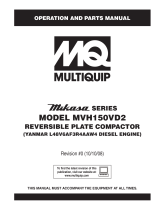 MQ Multiquip MVH150VD2 Operating instructions
MQ Multiquip MVH150VD2 Operating instructions
-
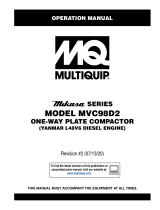 MQ Multiquip MVC98D2 Operating instructions
MQ Multiquip MVC98D2 Operating instructions
-
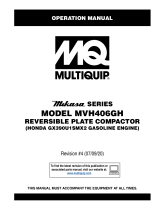 MQ Multiquip MVH406GH Operating instructions
MQ Multiquip MVH406GH Operating instructions
-
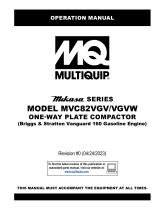 MQ Multiquip MVC82VGV Operating instructions
MQ Multiquip MVC82VGV Operating instructions
-
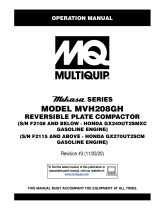 MQ Multiquip MVH208GH Operating instructions
MQ Multiquip MVH208GH Operating instructions
-
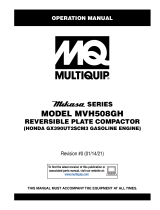 MQ Multiquip MVH508GH Operating instructions
MQ Multiquip MVH508GH Operating instructions
-
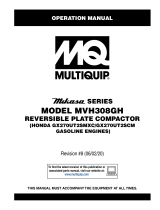 MQ Multiquip MVH308GH Operating instructions
MQ Multiquip MVH308GH Operating instructions
-
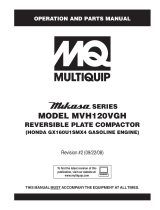 MQ Multiquip MVH120VGH Operating instructions
MQ Multiquip MVH120VGH Operating instructions
-
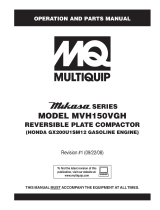 MQ Multiquip MVH150VGH Operating instructions
MQ Multiquip MVH150VGH Operating instructions
-
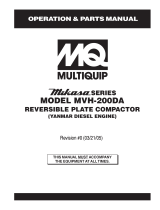 MQ Multiquip MVH-200DA User manual
MQ Multiquip MVH-200DA User manual
Other documents
-
 MULTIQUIP MVH408GH User manual
MULTIQUIP MVH408GH User manual
-
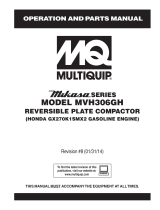 MULTIQUIP MVH306GH User manual
MULTIQUIP MVH306GH User manual
-
XtremepowerUS 6HP 4500-Pound Compaction Force Reversible Plate Compactor Construction CARB EPA Compliant 208cc Engine User manual
-
XtremepowerUS 61019-H User manual
-
XtremepowerUS 61015-H1 User manual
-
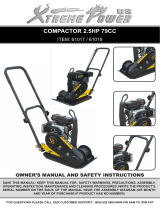 Xtreme Power 6HP 4500-Pound Compaction Force Reversible Plate Compactor Construction CARB EPA Compliant 208cc Engine User manual
Xtreme Power 6HP 4500-Pound Compaction Force Reversible Plate Compactor Construction CARB EPA Compliant 208cc Engine User manual
-
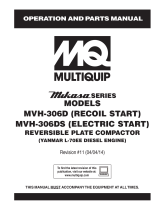 MULTIQUIP MVH-306D User manual
MULTIQUIP MVH-306D User manual
-
Stark 61012 Owner's manual
-
Power King PK0203-H User manual
-
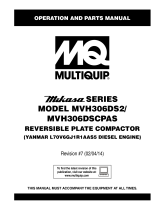 Multi Tech Equipment MVH306DS2 User manual
Multi Tech Equipment MVH306DS2 User manual














































































